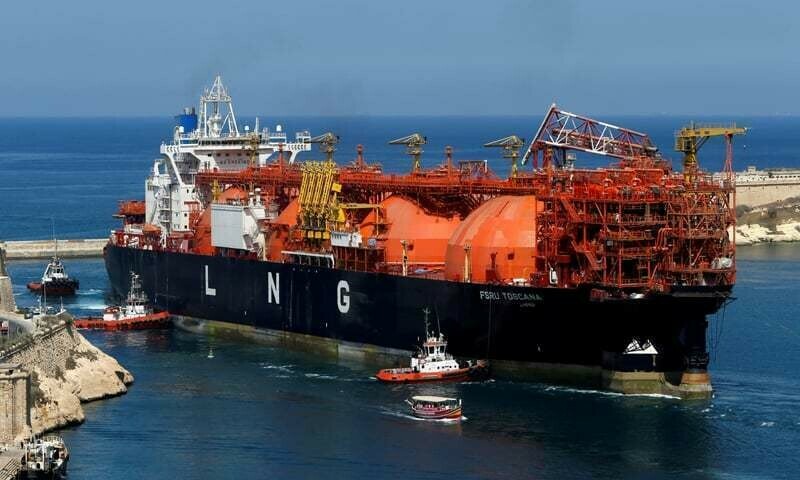• Declining electricity consumption due to sluggish economic activity blamed for delay
• Minister says five cargoes under long-term agreements already cancelled
• Denies media reports on discounted Russian oil deal
ISLAMABAD: Pakistan is in talks with Qatar to postpone the delivery of 10 liquefied natural gas (LNG) cargoes next year, as electricity consumption has declined due to sluggish economic activity and unaffordable energy costs.
This was stated by Petroleum Minister Musadik Malik while talking to journalists here on Wednesday. He said that five LNG cargoes scheduled for 2025 under long-term agreements with Qatar had already been cancelled, and negotiations are ongoing to defer an additional five cargoes to manage the surplus LNG in the country.
“Pakistan has already postponed five LNG cargoes and postponement of five additional cargoes is being considered further,” he said, adding that LNG had become surplus as LNG-based power plants were sidelined due to the economic merit order, and the private sector was unwilling to purchase LNG due to its high cost.
Pakistan usually imports between 120 and 140 LNG cargoes annually, with the majority (about 85-100) coming under long-term contracts with Qatar, along with additional long-term agreements and spot purchases. The country has not imported spot cargoes for nearly a year due to surplus electricity capacity in the system and a decline in consumption, ranging from two per cent to 18pc in different months.
The government has been urging independent power producers (IPPs) to prematurely terminate contracts in an effort to reduce capacity charges. At the same time, it recently introduced a winter incentive package for consumers to encourage higher consumption.
However, electricity consumption, even before the winter season, dropped to around 11,000MW, compared to the over 40,000MW of installed capacity, as industrial and commercial activities declined and various consumer groups shifted to renewable energy sources.
Responding to a question about recent visits of delegations from Saudi Arabia, the petroleum minister said that a total of 34 memorandums of understanding (MoUs) worth $2.7 billion had been signed across various sectors, including human resources, with Saudi Arabia’s private sector. Seven of these agreements had already been signed, he added.
Musadik Malik said five Saudi companies had participated in a roadshow held by Pakistan Refinery Limited in Saudi Arabia, with one of them expressing interest in investing $1.7bn in PRL upgrade under Brownfield oil refineries policy.
Regarding the proposed large greenfield refinery, the minister said Pakistan had appointed an international consultant on the advice of the Saudi side. The consultant is expected to provide a draft of feasibility study by December 24. On the basis of this study, a roadshow for setting up a new refinery worth $8-10bn in Pakistan would be held in Saudi Arabia soon, he said.
Responding to questions about oil imports from Russia, the minister said that discussions between the two sides have been ongoing, addressing challenges such as insurance, deal structure, payment methods, cargo size, shipping lines, and, most importantly, the potential risk of secondary US sanctions on such transactions.
During the tenure of the Pakistan Democratic Movement (PDM) government, Mr Malik said, it was decided to import Russian oil by establishing a special purpose vehicle (SPV) within a public sector company, with payments to be made in Chinese currency. However, the caretaker government amended the framework and halted negotiations to import oil from Russia.
He explained that PRL had initially imported a cargo of oil from Russia, but the caretaker government decided against importing through the public sector company, allowing the private sector to handle the imports instead. The minister categorically denied media reports claiming that Pakistan had reached a deal with Russia to import crude oil at a discounted rate.
Published in Dawn, December 5th, 2024







